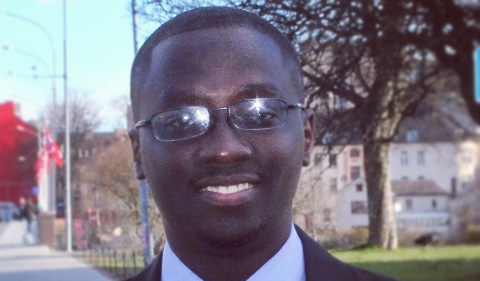
Kwaku Opoku Dankwah
Political Science graduate student Kwaku Opoku Dankwah co-authored an article on “Mixed fragmented migrations of Iraqis and challenges to Iraqi refugee integration: the Jordanian experience” in the Middle Eastern Studies journal.
Upon completing high school in St. John’s Grammar (Accra-Ghana), Dankwah enrolled in a Bachelor of Arts Degree (Political Science Major and Sociology Minor) Program at the University of Ghana. He graduated in 2014 and joined the Office of the Legal Counsel of the same university as an administrative assistant during his National Service. Dankwah then enrolled in an MSc program in Globalization at the Norwegian University of Science and Technology (NTNU) in 2015. Outside the academic domains during his days at NTNU where he served as a research assistant at the Department of Social Work and attended two separate intensive courses in two of the ParisTech group of engineering schools, Dankwah was the acting President in addition to his official portfolio as the general secretary for the Ghanaian Students Association of NTNU.
Dankwah’s decision to enroll in OHIO includes the renowned faculty of the Political Science Department and its relatively smaller size. With an eye to a PhD, Dankwah believes OHIO’s political science department will greatly aid him in nurturing his investigative skills in the Political Science discipline. His current academic interests include Sino-Africa interstate relations and he looks forward to exploring Chinese soft power in Africa.
Abstract of the article: This article focuses on Iraqis in Jordan who intend to migrate further. It is maintained that the distinction between forced and voluntary migrations and the formal labels used to categorize migrants do not express the complexity of movements within and from the region. It is argued that movements out of Iraq and into Jordan, and further migrations to the West, are underpinned by more than one reason though triggered by force or violence. Indeed, the reasons urging movements of Iraqis in our study took different turns as people got to particular places and faced the context of reception there. We have identified challenges to Iraqi refugee integration and related them to the variety of intended and unintended fragmented movements that go together with multiple changes in formal migrant statuses. The article thus contributes to discussions on mixed migrations and fragmented migrations in the region and portrays the agency of Iraqis in migrating amidst the structural factor of force. The article also provides valuable contributions to discussions on fragmented journeys of would-be asylum seekers in the West.


















One Comment